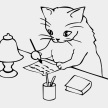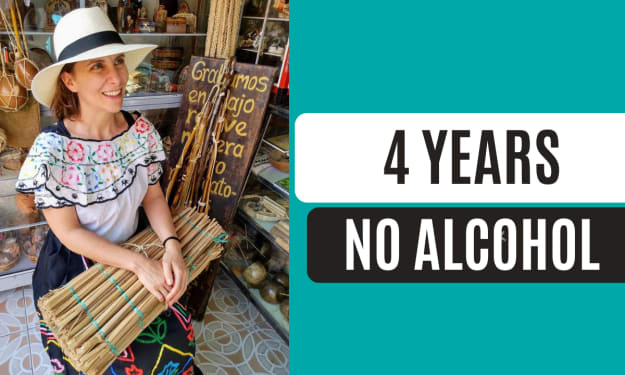Desert Mermaids and Other Anomalies
The mythic and fabled are changing with the times too.

To say Anne-Marie Buchamp was an overachiever was an understatement. Frankly, it was her father’s fault for leaving such huge shoes to fill with his solo quests by ocean or by foot in the desert. In the realm of archaeology, he was a legend—but Anne-Marie had learned that often that moniker came with a price: usually you had to be dead to gain it. As a proud Buchamp, however, she had excelled in her studies at the Academia of Florence while also achieving high marks in extracurriculars like fencing and martial arts. Her one disappointment was that she had yet to perfect her Latin.
But that mattered little when she was now on what she suspected to be a rescue mission to save her father.
When her father had last visited in Florence during the summer, he had looked the same as he always did: a bit too unshaven, in need of a haircut, and his skin darkened by what could only mean too much time in the sun. But there had been an edge to him, like a touch of anxiety, as he kept glancing over his shoulder as if he expected someone to approach him unawares at any moment.
“Anne, sweetheart, there’s something I need to tell you,” he had said, clasping his hand over hers as they sat in an outside cafe. She had leaned forward, eager, as if she were just waiting to hear another tale of his escapades—as if she were still just a child sitting on his knee while listening raptly to his assurance that he had come across a dragon’s skeleton in a castle dungeon on the British Isle.
His sharp eyes had looked into hers before he took a stuttering breath. “I need you to be careful,” he said. “I’m going away for a while—I don’t know how long—but there will be people trying to find me. And they won’t like it if you don’t have answers for them.”
“Papa, what do you—”
“Listen to me, Anne,” he said. “You just need to tell them that last you heard I had gotten myself captured in South America. That will lead them off the trail for a while, enough time for you to get away.”
“Get away? But, Papa—”
“The less you know in this regard, the better. Do you remember Chelsea Jones, the secretary I hired?” She had nodded. “She’ll be in touch as soon as she’s able. But whatever you do, Anne, don’t trust the people asking after me. They’ll try to do or say anything to trick you into helping them.”
All of it had made Anne-Marie’s head spin, but she had nodded. Her father’s smile had been one of relief.
“That’s my girl,” he whispered, and right before he left he had pressed a small notebook into her hands. “Keep this safe for me. Goodbye, my darling.”
The last image she had of him was his back as he departed. Where, she had no idea. But upon opening the notebook, there were only rushed sketches of bones he had found in the Sahara desert. But they were hardly clues when some of the sketches had been smeared and left in disarray.
Largely, however, her father’s warnings had gone the way of simple speculation. No one, besides Headmistress Dauphine, had inquired after her father’s whereabouts. Anne-Marie just breezily said her father was off on another adventure—which wasn’t technically a lie, though she herself knew not what the truth was.
What really rattled her was her mother’s appearance at the Academia in mid-autumn.
“I’m taking you home,” Leah Buchamp (nee Maxim) said when Anne-Marie arrived in the headmistress’s office. Anne-Marie, who was often very serious and not prone to exaggeration, looked at her mother in abject shock and appall.
“I can’t leave the Academia,” she said, affronted, as if she had never heard such a terrible thing. “I’m finishing up my studies!”
Her mother simply clicked her tongue in distaste. “You’ll do correspondence school,” she said. “I shouldn’t have listened to your father about your schooling. I let him control your life far too much.”
“But, Mother—”
“Go pack your things,” her mother said. Even a glance to Headmistress Dauphine offered little more than a sympathetic look. Anne-Marie turned away, an indignant sob building in her throat.
But Anne-Marie was her father’s daughter: the night before she and her mother left the hotel in Florence, she packed a small satchel of clothing and topped it off with her father’s notebook. Into the night she fled, taking a night bus to put more kilometers between her and her mother. Anne-Marie hoped her mother’s negligence would not fail to resurface in this instance.
Her next stop was the home of Harlan Trent, an antique shop owner who had been her father’s colleague on various projects in years past. It was 6 AM when she rang the apartment above his store.
When Harlan appeared downstairs, still wearing a nighttime dressing gown and peering at her tiredly through the glass, he opened the door to usher her inside. “I knew you’d be coming sometime soon,” he said. “Chelsea left something here for you.”
“Chelsea?” Anne-Marie blinked at him. “You’ve heard from her?”
“Not in person,” he said. “I got the suspicion that she was in a, er, rather sticky situation.”
Anne-Marie was growing more and more alarmed. But really, why should she be surprised? She had obviously gotten lax in the months since her father’s initial warning.
“What is it?” she asked, and Harlan brought her what looked like a trinket box trimmed in gold and jade. When she opened the box, she found shell-like objects that straightened into sharp spikes rather than having been curved into shape. Anne-Marie looked at Harlan in confusion, and he just held out a cream envelope with her name on it.
“Find the desert mermaids,” the note said. Anne-Marie frowned.
“A phone call wouldn’t have sufficed?” she asked, irritable, while Harlan chuckled.
“Old magic calls for old ways,” he said in that mysterious way he sometimes had. But Anne-Marie was practical. Even “magic” could be explained away by some logic or science.
“I suppose I have to be the adult here,” she said. “My father must have passed the torch of adventure to me.”
And that was only the beginning.
About the Creator
Jillian Spiridon
just another writer with too many cats
twitter: @jillianspiridon
Enjoyed the story? Support the Creator.
Subscribe for free to receive all their stories in your feed. You could also pledge your support or give them a one-off tip, letting them know you appreciate their work.






Comments
There are no comments for this story
Be the first to respond and start the conversation.